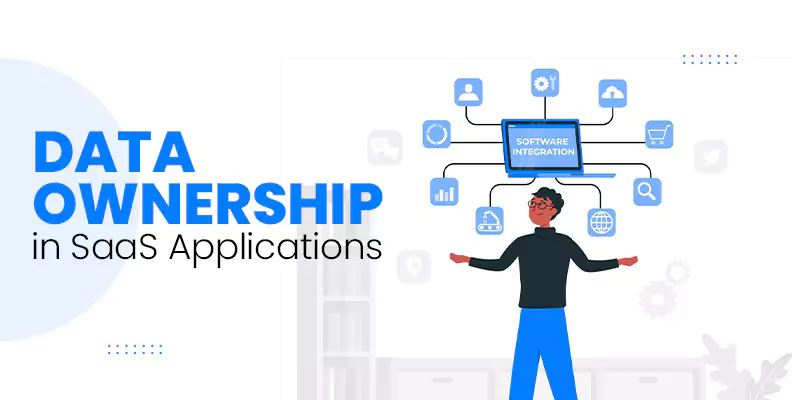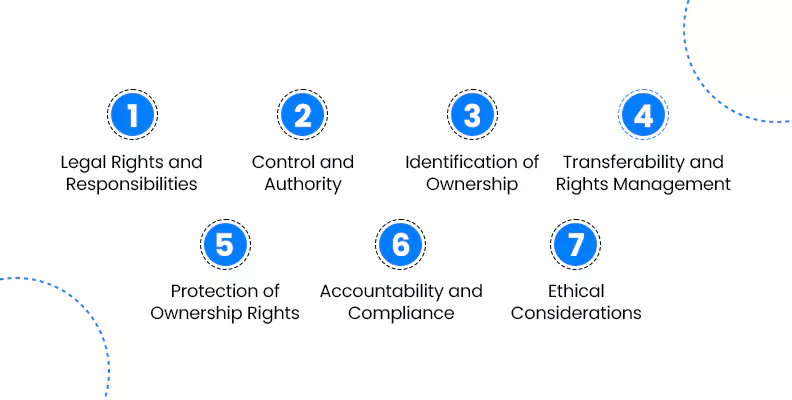Loading.....
Data Ownership in SaaS Applications

In the bustling realm of modern business, there's a treasure trove that's often overlooked – your data. It's not just a bunch of numbers and codes; it's the heartbeat of your organization, pulsating with insights, stories, and opportunities. But like any cherished possession, your data needs tender loving care and responsible stewardship.
However, with the increasing importance of data comes the need for effective data ownership management practices. In this blog, we will get to know the best practices for managing data ownership to ensure the security, integrity, and usability of your digital assets.
Data Ownership Definition

Data ownership refers to the legal rights and responsibilities associated with data assets. It defines who has control over the data, including the rights to access, use, transfer, and dispose of the data. In essence, data ownership determines who has the authority to make decisions regarding the data and how it is managed throughout its lifecycle.
To understand data ownership in detail, let's break down its key components:
- Legal Rights and Responsibilities: Data ownership entails both rights and responsibilities under the law. These legal rights may vary depending on jurisdiction and applicable regulations. Generally, data owners have the right to control how their data is collected, processed, stored, and shared. They are also responsible for ensuring compliance with relevant laws, regulations, and contractual agreements governing the use of the data.
- Control and Authority: Data ownership confers control and authority over the data to the rightful owner. This includes the ability to grant or restrict access to the data, determine its use and purpose, and establish security measures to protect it from unauthorized access or misuse. The owner may delegate certain data management tasks but retains ultimate decision-making authority.
- Identification of Ownership: It's essential to identify the owner(s) of data assets within an organization or across multiple parties. Ownership may be assigned based on factors such as creation, acquisition, investment, or legal agreements. Establishing clear ownership helps prevent disputes, ensures accountability, and facilitates effective data governance.
- Transferability and Rights Management: Data ownership may be transferable under certain circumstances, such as mergers, acquisitions, or contractual arrangements. However, the transfer of ownership typically requires explicit consent and adherence to legal requirements. Additionally, data owners may choose to license or share their data with third parties while retaining ownership rights and enforcing usage restrictions through licensing agreements or contracts.
- Protection of Ownership Rights: Data owners have a vested interest in protecting their ownership rights against infringement, theft, or unauthorized access. This often involves implementing robust security measures, such as encryption, access controls, data masking, and monitoring systems. Data owners may also pursue legal remedies against unauthorized use or misuse of their data assets.
- Accountability and Compliance: Data owners bear responsibility for ensuring compliance with relevant laws, regulations, and industry standards governing data privacy, security, and confidentiality. They must establish policies, procedures, and controls to safeguard data integrity, prevent breaches, and mitigate risks associated with data ownership. Failure to comply with regulatory requirements may result in legal penalties, reputational damage, and financial liabilities.
- Ethical Considerations: Beyond legal obligations, data ownership entails ethical considerations related to transparency, fairness, and accountability in data management practices. Data owners have a moral imperative to use data responsibly, respect individual privacy rights, and uphold ethical standards in data collection, processing, and sharing activities.
Impact of Data Ownership

-
Security and Privacy Concerns
Data ownership directly influences the security and privacy of sensitive information. When organizations entrust their data to a SaaS provider, they rely on the provider's security measures to safeguard against breaches and unauthorized access. Clear delineation of data ownership ensures that businesses retain control over access permissions and encryption keys, enhancing data security and mitigating privacy risks.
-
Compliance and Regulatory Requirements
Data ownership plays a pivotal role in meeting regulatory compliance requirements, such as GDPR, HIPAA, and CCPA. Organizations must ensure that their chosen SaaS provider adheres to relevant data protection regulations and facilitates compliance efforts through transparent data ownership policies. By retaining ownership of their data, businesses can maintain audit trails, demonstrate accountability, and fulfill legal obligations without compromising regulatory compliance.
-
Vendor Lock-in and Portability
Data ownership influences vendor lock-in and data portability within the SaaS ecosystem. In cases where the SaaS provider asserts ownership or restricts data portability, organizations may encounter challenges when migrating to alternative solutions or integrating disparate systems. By asserting ownership over their data, businesses retain flexibility and control, minimizing dependence on a single vendor and facilitating seamless transitions between SaaS platforms.
-
Data Monetization and Intellectual Property
Ownership of data extends beyond mere possession to encompass rights related to data monetization and intellectual property. Businesses must carefully evaluate data ownership clauses in SaaS agreements to safeguard against unauthorized use or exploitation of proprietary data assets. Clear delineation of data ownership empowers organizations to capitalize on data-driven insights, maintain competitive advantage, and protect intellectual property rights in the digital marketplace.
10 Best Practices for Managing Data Ownership
-
Review Service Agreements Thoroughly
Before subscribing to a SaaS application, organizations should carefully review service agreements to understand the terms and conditions governing data ownership, usage rights, and responsibilities. Legal counsel can provide invaluable guidance in negotiating favorable terms and ensuring alignment with business objectives.
-
Implement Data Governance Frameworks
Establishing robust data governance frameworks is essential for managing data ownership effectively. By defining clear roles, responsibilities, and accountability structures, organizations can promote data stewardship, enforce compliance standards, and mitigate risks associated with data misuse or unauthorized access.
-
Foster a Culture of Data Literacy
Promote data literacy and awareness among employees to foster a culture of responsible data stewardship. Educating personnel on data ownership rights, security best practices, and compliance requirements empowers them to make informed decisions and mitigate risks associated with data management and usage.
-
Establish Clear Data Ownership Policies
Start by defining clear data ownership policies that outline the roles, responsibilities, and accountability of individuals or departments regarding different types of data. Clearly specify who owns specific datasets, who can access them, and under what circumstances.
-
Conduct Regular Data Audits
Conduct regular audits to assess the quality, accuracy, and security of your data assets. Identify any discrepancies, inconsistencies, or unauthorized access and take necessary measures to rectify them. Data audits help maintain data integrity and ensure compliance with regulatory requirements.
-
Implement Access Controls
Implement robust access controls to restrict access to sensitive data based on job roles, responsibilities, and business needs. Utilize authentication mechanisms such as passwords, multi-factor authentication, and encryption to safeguard data from unauthorized access or misuse.
-
Secure Data Transmission and Storage
Ensure secure transmission and storage of data by implementing encryption, secure sockets layer (SSL) protocols, and robust data backup solutions. Regularly update security protocols and software patches to mitigate potential vulnerabilities and protect against cyber threats.
-
Monitor and Audit Data Usage
Implement monitoring tools and audit trails to track data usage, access patterns, and modifications in real-time. Monitor data flows across systems, networks, and applications to detect any anomalies or suspicious activities that may indicate unauthorized access or data breaches.
-
Ensure Compliance with Regulatory Requirements
Stay abreast of regulatory requirements such as GDPR, CCPA, HIPAA, and industry-specific regulations governing data privacy and security. Ensure compliance with data protection laws, privacy regulations, and industry standards to avoid legal repercussions and protect the reputation of your organization.
-
Continuously Improve Data Ownership Practices
Continuously evaluate and improve data ownership practices based on evolving business needs, technological advancements, and regulatory changes. Solicit feedback from stakeholders, conduct post-implementation reviews, and adjust data management strategies accordingly.
Conclusion
In conclusion, data ownership is a critical consideration in SaaS-based applications, with far-reaching implications for security, compliance, vendor relationships, and intellectual property rights. By understanding the impact of data ownership and implementing best practices for managing data assets, organizations can navigate the complexities of the SaaS landscape with confidence, safeguarding their interests and maximizing the value of their data investments. As businesses continue to embrace digital transformation, proactive management of data ownership remains paramount in ensuring sustained success and resilience in an increasingly interconnected world.
 Back to blog
Back to blog












